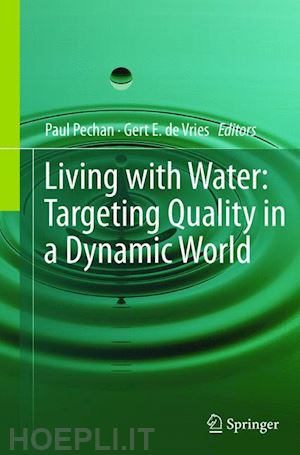
Questo prodotto usufruisce delle SPEDIZIONI GRATIS
selezionando l'opzione Corriere Veloce in fase di ordine.
Pagabile anche con Carta della cultura giovani e del merito, 18App Bonus Cultura e Carta del Docente
The factors affecting water quality are many: The increasing buying power and health concerns of the world population contribute to the creation of new products whose production and disposal lead to the release of chemicals harmful to the environment; the ever-growing world population requires a steady food supply, which increases the pressure to use even more chemicals to control various crop pests; and due to climate change, head waters, rivers, and oceans are becoming increasingly warmer, acidic, and eutrophic as the result of carbod dioxide overload.
Using specific examples, Water Quality and Resource Management will address the many challenges of providing clean water to the growing world population. It will also discuss the new technologies that are being developed, for example, to treat and reuse waste waters, and the innovative monitoring approaches that help scientists to assess water quality risks. Such risk assessments are urgently needed to help draft legislations and allow enforcement to ensure accessability to quality water for all.
The structure of the book will be the following: Each chapter will provide information about a specific water environment and the challenges it faces. This will be followed by discussion of the pollution effects and actions taken to redress the situation. Finally, future trends will be discussed.
1. Living with Water.- 2. Mountain Waters as Witnesses of Global Pollution.- 3. Wastewaters are not Wastes.- 4. Pollutants in Water: The Case of Pharmaceuticals.- 5. The Oceans and Their Challenge to Conserve Marine Biodiversity.
Paul Pechan is a researcher at the Department of Communication and Media Research, Ludwig Maximilians University Munich. His background is in plant physiology and molecular biology. Since 2004 he has been involved in communicating science to specific target groups, including the youth. His latest work includes scientific papers on learning (information recall, motivation), books on risks in our environment and food, and a UNESCO teaching manual on GMO issues. He is also actively involved in the production of science films for schools and the public.
Gert E. de Vries received training in molecular genetics and microbiology and received his PhD at Leiden University at the faculty of Life Sciences. He subsequently has been involved in basic research in microbiology and molecular biology at universities in Santa Cruz (CA, USA), Amsterdam, Leiden and Groningen (the Netherlands) covering a period of twenty years. He then changed his career to become involved with science communication and technology transfer while employed for a private company.











Il sito utilizza cookie ed altri strumenti di tracciamento che raccolgono informazioni dal dispositivo dell’utente. Oltre ai cookie tecnici ed analitici aggregati, strettamente necessari per il funzionamento di questo sito web, previo consenso dell’utente possono essere installati cookie di profilazione e marketing e cookie dei social media. Cliccando su “Accetto tutti i cookie” saranno attivate tutte le categorie di cookie. Per accettare solo deterninate categorie di cookie, cliccare invece su “Impostazioni cookie”. Chiudendo il banner o continuando a navigare saranno installati solo cookie tecnici. Per maggiori dettagli, consultare la Cookie Policy.